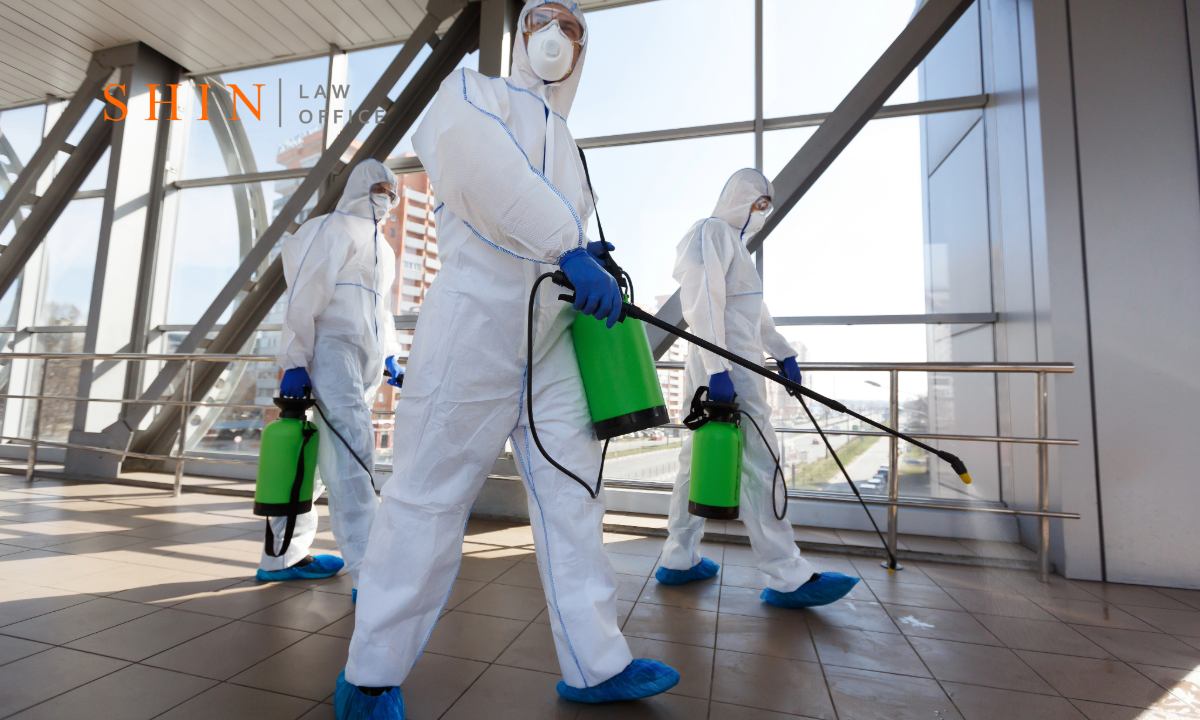By Anthony I. Shin, Esq. | Attorney at Law | Toxic Torts | Shin Law Office
When Mold Becomes a Business Crisis
As a business attorney handling toxic tort and property damage cases in Northern Virginia, I’ve seen how quickly a small mold problem can become a full-blown business emergency. In Pentagon City, where retail shops and restaurants operate in high-traffic commercial spaces, the cost of even a short closure can be devastating. Mold contamination doesn’t just affect walls or ceilings, it threatens your ability to stay open, serve customers, and keep employees safe.
For business owners, mold is more than an inconvenience. It can trigger health code violations, damage inventory, and lead to insurance disputes that stall financial recovery. Whether it starts with a slow leak under a sink, a burst pipe in the ceiling, or humidity from HVAC systems, mold contamination can spread quickly and silently, forcing you to shut down operations before the damage becomes visible.
How Mold Impacts Retail and Restaurant Environments
Hidden Growth in High-Moisture Areas
Restaurants are especially vulnerable because of constant exposure to water and humidity. Mold thrives under dishwashing stations, behind refrigerators, or in poorly ventilated kitchens. In retail spaces, roof leaks, damaged drywall, or condensation from air ducts can cause contamination behind display walls or ceilings.
When customers or employees begin to notice a musty smell or discoloration, the damage is usually already widespread. Mold spores can attach to surfaces, clothing, and HVAC systems, turning a minor maintenance issue into a public health concern.
The Cost of Business Disruption
Once mold is detected, local health departments may require immediate remediation or closure until the issue is resolved. This interruption often leads to significant losses, including spoiled inventory, canceled reservations, and reduced customer traffic. Even after cleanup, lingering odors or negative publicity can damage a business’s reputation in the long term.
Insurance and Liability Disputes After Mold Contamination
Understanding Your Business Interruption Coverage
Many business owners assume their commercial insurance will automatically cover mold-related damage and lost income. Unfortunately, mold is one of the most commonly disputed claims. Some policies exclude mold altogether or limit payouts unless the damage results from a “covered peril,” such as a burst pipe or storm damage.
When I review mold-related business interruption claims, I often find that insurers deny coverage by arguing the damage was “preventable” or caused by “maintenance issues.” That’s where legal representation becomes essential—to challenge unfair denials and force insurers to honor valid claims.
Landlord and Tenant Disputes
In multi-tenant buildings, determining responsibility can get complicated. If you rent your space, your lease agreement may specify who is responsible for maintenance, ventilation, and plumbing. Landlords who fail to address leaks or HVAC issues can be held liable for your losses if their negligence caused the mold growth.
In some cases, multiple parties—property owners, contractors, or even cleaning companies—share responsibility. My role is to uncover where the breakdown occurred and hold each accountable.
Proving Mold Damage and Financial Loss
Gathering the Right Evidence
Successful mold claims rely on detailed evidence. That includes environmental testing reports, professional remediation assessments, and business records showing financial loss during the closure period. Keeping records of your communication with your landlord and insurer is also crucial.
If you’re facing a claim denial, I work with environmental and insurance experts to connect the contamination directly to covered causes under your policy. This documentation strengthens your case and increases the likelihood of a fair settlement.
Documenting Lost Income
For restaurants and retailers, proving loss of income requires financial precision. I often help clients compile sales records, canceled reservations, and payroll data to demonstrate the full economic impact of the interruption. This step can be the deciding factor in whether you recover full compensation.
How I Help Pentagon City Business Owners Recover
When I represent business owners affected by mold contamination, my goal is to help them recover quickly while protecting their long-term interests. I understand the pressure to reopen fast, but I also make sure you don’t rush into a bad settlement that leaves future liabilities unresolved.
I negotiate with insurers, landlords, and contractors to ensure accountability and proper remediation. I also help business owners pursue compensation for structural damage, equipment loss, and ongoing business interruption costs. My priority is always your recovery, both financial and operational.
Protecting Your Business Before It’s Too Late
If your Pentagon City restaurant or retail shop has experienced water damage, strange odors, or visible mold, act immediately. Early intervention can prevent a complete shutdown and reduce the risk of health code violations. But if you’re already facing closure or an insurance dispute, legal guidance can make all the difference.
Mold contamination doesn’t just attack buildings—it can threaten livelihoods. Protect your investment by understanding your rights, reviewing your insurance coverage, and taking swift legal action when necessary.
— Anthony I. Shin, Esq.
Principal Attorney | Shin Law Office
Call 571-445-6565 or book a consultation online today.




